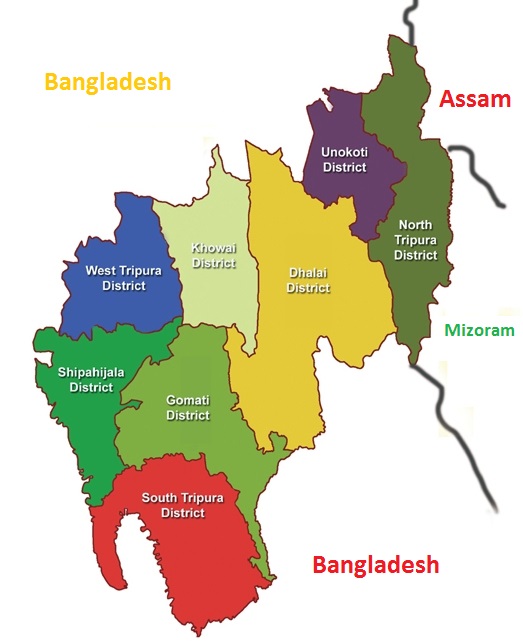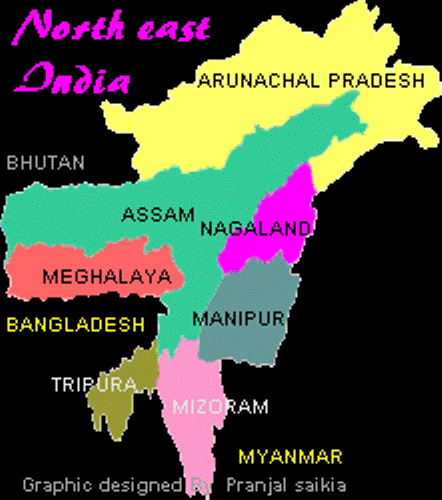|
|
|
|

Tiprasa, that is
the Tripuris, the Native people of Tripura, are the
original inhabitant of this lofty north eastern state of India since time immemorial. The
Tripuri dynasty had ruled the kingdom for more than 5000 years; a total of 185 kings had
ruled over the state and with stood various dynasties of India and different wars of the
world.
We identify
ourselves as Tiprasa or Tripuri as we are the indigenous inhabitant of present Tripura states
or erstwhile Tripura kingdom. It is not only our ancestral and birth right but also
logical to take this Identity. But due to some obscure reason we are in the path of
losing this right of 5000 years old. Must not we fight tooth and nail to preserve this
Identity of our Ancestors?
|
|
|
The
state of Tripura is located in the north eastern part of India. It is one of the eight
North Eastern states. It falls in to the category of Oldest States, it had been mentioned
in the Epic Mahabharata. The state is bounded four-fifth by present Bangladesh, where is
it is connected with India through one fifth border by the states of Asom and Mizoram,
towards the north and eastern border. In the hey days the border of the state was upto
Brahmaputra and Ganges river, which had been reduced to present area during the
medieval period. Tripura has an area of 10,477 square kilometers, full of
beautiful hills, hillocks, dales, lush green valleys, rives, streams, ponds and
lakes. The states lies between the latitude of 22º56 and 24º32 North and
longitude of 91º10 and 92º21 East.
 The hills run
north to south, so also most of the rivers. The rivers ultimately flows to the Bangladesh
and fed the rivers of that country. It is one of the most beautiful states, the eyes can’t afford to blink while on
the move through the roads of Tripura. the rives are not so big to flood away the people,
the hills are not so high that it can not hold any vegetation like the peaks of Himalayan
ranges, the sea is not so close to embark upon its land during the Tsunami or the danger
of being submerged by the rising water of ocean due to green house effect. Her people are
protected from the scorch of heat from the Sahara or Kalahari Desert, similarly protected
from the frosty cold of snow fall. On the other hand neither are her children are devoid
of any needs to live in. There is not an inch of land which does not support to the life
on her. There is no over rain fall or any long drought, she is the most caring, loving
and protecting mother that any one might encountered. The hills run
north to south, so also most of the rivers. The rivers ultimately flows to the Bangladesh
and fed the rivers of that country. It is one of the most beautiful states, the eyes can’t afford to blink while on
the move through the roads of Tripura. the rives are not so big to flood away the people,
the hills are not so high that it can not hold any vegetation like the peaks of Himalayan
ranges, the sea is not so close to embark upon its land during the Tsunami or the danger
of being submerged by the rising water of ocean due to green house effect. Her people are
protected from the scorch of heat from the Sahara or Kalahari Desert, similarly protected
from the frosty cold of snow fall. On the other hand neither are her children are devoid
of any needs to live in. There is not an inch of land which does not support to the life
on her. There is no over rain fall or any long drought, she is the most caring, loving
and protecting mother that any one might encountered.
|
|
The history of
Tripura is as old as the history of India. It is not impossible but difficult to
ascertain how the name of Tripura kingdom had come into existence. The most plausible is
that it was named after the mightiest ruler of Tripura, the son of Daitya, Tripur, the
40th descendant from Yayati, the famous king of Chadra (Lunar) dynasty. In the
Mahabharata Trilochana is mentioned as the king of Tripura at the times of kurukshetra
war, the same fact is also corroborated in the royal chronicle of Tripura, the Rajmala.
Tripur was described as most powerful and unreligious in Shivmahapuran, there fore he was
assassinated by Lord Shiva, consequently her widow queen Hiravati was blessed with a most
religious and spiritual son named Trilochana, having third eye, who as also known as
Subrai raja by the Tripuri people ever since. He is equivalent to Lord Rama of Hindu
pantheon and adored by all section of people.
|
|
 Tripura
was originally land of almost exclusively of Tripuri people till the nineteenth century.
Up to the middle of 20th century Tripuri people were still a majority in the
state, but by the turn of 6th decade of last century the Tripuri people turned
out to minority in their own state. And in the beginning of 21st century the
Tripuri people became a minority in the land of their fore fathers. It is stated that
they now consist of only 31% odd including other indigenous people. Earlier the state was
having more of Muslim Bengali people, but it had, since the middle of the century
gradually been transformed of having more Hindu Bengali then Muslim because of influx
from erstwhile East Pakistan. Tripura
was originally land of almost exclusively of Tripuri people till the nineteenth century.
Up to the middle of 20th century Tripuri people were still a majority in the
state, but by the turn of 6th decade of last century the Tripuri people turned
out to minority in their own state. And in the beginning of 21st century the
Tripuri people became a minority in the land of their fore fathers. It is stated that
they now consist of only 31% odd including other indigenous people. Earlier the state was
having more of Muslim Bengali people, but it had, since the middle of the century
gradually been transformed of having more Hindu Bengali then Muslim because of influx
from erstwhile East Pakistan.
|
|
The comparative over view of the
population ratio of the different ethnic races for the past one century will give a clear
understanding of Tripura migration and refugee predicament of present time. In the year
1901 AD, the population percentage of different communities in Tripura were approximately
viz. the Tripuri and other indigenous people including the Manipuri was 74.68%, the
Muslim Bengali 25.9 %, the Hindu Bengali were just 8.6%. Just after 100 years apart the
percentage of different ethnic races as per the census report of 2001 AD stands as
follows, approximately the Tripuri and other indigenous people including Manipuri came
down to 31.82%, the Muslim Bengali went down to 8%, where as the Hindu Bengali percentage
went up to 60%. This is how the population ratio has just been substituted between the
Tripuris and Hindu Bengali in the matter of just one century apart.
There have been multiple
impact of demographic changes that took place in Tripura following refugees
settlement from erstwhile East Pakistan in the after math of India'a
independence and partition. Apart from the political, economical, social impacts
it has also affected the Cultural and topographical aspect of Tripura. Most of
the names of different villages, hamlets, rivers, tributaries, markets, area,
hills, hillocks, towns etc had been Changed to suit the tongue of refugees, who
had since became majority population. This created the impression that Tripura
state did not belonged to Native Tripuri people, rather it created the idea that
the land had since been occupied by Indo-Arian language speakers, which it was
not till mid 20th century in true senses. These are just a tip of ice berg, the
list if added it would make almost all the geographical names of Tripura.
Go to Top
Related links
tripurasociety.com
subraimission.org
|
|
|